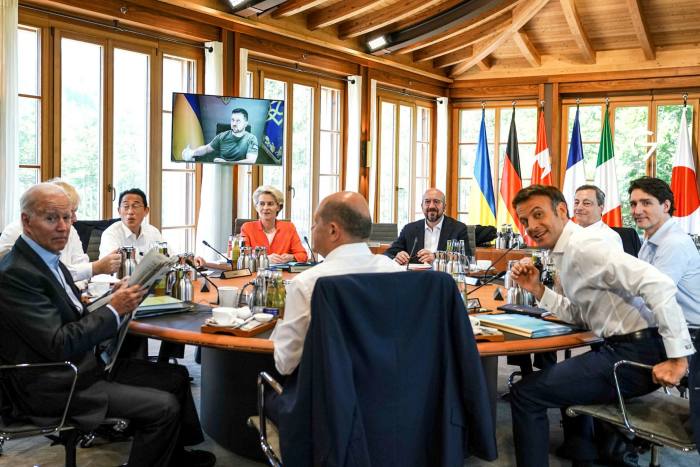PBoC governor pledges to maintain supportive monetary policy

China’s central bank governor pledged to maintain an accommodative monetary stance for the country’s economy and stressed that its inflationary outlook was “stable”, while other major economies aggressively increase interest rates to combat soaring prices.
Yi Gang told state English-language broadcaster CGTN that the People’s Bank of China would “continue to be accommodative to support economic recovery in the aggregate sense” but stopped short of announcing any concrete measures for the Covid-damaged economy.
The strict lockdowns brought in to eliminate the virus in China have dented its economic prospects, with several banks downgrading their forecasts for the country’s growth this year and Premier Li Keqiang issuing a stark warning about the country’s prospects this quarter.
While the economic slowdown showed tentative signs of easing in May, economist are also concerned that any further lockdowns could severely damage the economy.
On Monday a report in Beijing Daily suggesting a party official had said the country would maintain its mandatory testing regime for residents for the next five years briefly knocked the country’s stock market indices on an otherwise bullish day for its equities.
The report was later republished without the “five years” reference, with the paper blaming it on a publishing error.
On Monday evening, Yi said that the bank’s monetary policy would support the economy through the shocks caused by Covid-19 and the Ukraine war and would also emphasise supporting small and medium-sized enterprises.
China has maintained its one-year loan prime rates steady for the past six months, while it last lowered the five-year rate, which underpins mortgage costs, to 4.45 per cent in May.
Voyager crypto exchange issues default notice to Three Arrows Capital
Singapore-based cryptocurrency hedge fund Three Arrows Capital was issued with a default notice on Monday, as the industry’s biggest companies reel from a bout of market volatility and corporate collapses.
Crypto currency exchange Voyager Digital said it had issued the notice after the fund failed to make payments on a loan worth 15,250 bitcoin and $350mn in USD Coin, a stablecoin pegged to the US dollar. The total liabilities are worth more than $650mn.
Shares of Voyager Digital crashed more than 60 per cent last Wednesday after the crypto broker revealed its loan to Three Arrows.
The prominent crypto hedge fund tipped into a crisis after it failed to meet demands from lenders to stump up extra funds when its digital currency bets turned sour. Its troubles come as a credit crunch grips the industry.
Voyager added that it was able to keep operating due to a $75mn loan from crypto market trading company Alameda Research.
“We are working diligently and expeditiously to strengthen our balance sheet and pursuing options so we can continue to meet customer liquidity demands,” said Stephen Ehrlich, chief executive of Voyager.
China Evergrande vows to ‘vigorously’ oppose winding-up petition

China Evergrande, the world’s most indebted property developer, said that it would “vigorously” oppose a winding-up petition filed by one of its creditors on Tuesday, the latest sign of investor pressure on the group since it was formally declared in default in December.
The petition was filed with Hong Kong’s High Court by Top Shine Global, an investment holding group, and is related to an obligation worth HK$862.5mn (US$109.9mn), Evergrande said.
Evergrande said that it did not expect the petition to affect its restructuring plan or timetable, which it plans to release by the end of next month.
Investors have closely watched for signs of progress in Evergrande’s drawn out default and restructuring process, with international groups making various plays to recover their debts, including seizing property and threatening legal action.
The winding-up petition, the first such petition disclosed by Evergrande, is the latest sign of pressure from the company’s creditors.
The company added that, if the petition were successful, any disposition of property, transfer in shares or changes in the status of members of the company made after when the petition was presented on Friday last week would be void.
What to watch in Asia today
Australia-Malaysia: Australian foreign minister Penny Wong will visit Malaysia to meet her counterpart Saifuddin Abdullah, defence minister Hishammuddin Hussein and trade and industry minister Azmin Ali.
Nato: Officials will gather in Madrid on Tuesday for three days of discussions, including Nato’s expansion in the wake of Russia’s invasion of Ukraine. One item on the agenda is whether the group should respond to China’s growing global influence.
Markets: US stocks faltered on Monday after Asia-Pacific equities notched strong gains boosted by Shanghai’s declaration of victory over its coronavirus outbreak and easing concerns over the risk of aggressive interest rate rises. Investors in Chinese markets will be on the lookout for any signs as to how long the country’s zero-Covid policy might last, after an allegedly erroneous report that Beijing would continue mass testing its population for the next five years dented market sentiment on an otherwise positive Monday. Australian and Japanese equities rose on Tuesday morning, but futures in Hong Kong pointed lower.
G7 ready to explore caps on energy prices to curb Russian revenues

G7 members are to explore ways of curbing energy costs, including via possible caps on the price of oil and gas, at a summit that has been overshadowed by fears of a recession induced by rising inflation.
Officials on Monday evening settled on summit conclusions that seek to develop solutions to reducing Russia’s hydrocarbon revenues while minimising the negative impacts of high energy prices, officials said.
According to a draft text seen by the Financial Times, leaders will explore the “feasibility” of introducing temporary price caps on imports of energy — a reference to a US-led push for a ceiling on the Russian oil price. A G7 official said earlier that capitals agreed it was a good idea, but a “great deal of work” remained to be done to make it a reality.
The G7 leaders were meeting four months into a war in Ukraine which has pushed up the price of food and hydrocarbons, triggering fears of a global recession. The summit, hosted by Germany in the Bavarian Alps, is due to conclude on Tuesday.
The move on price caps on Russian oil comes alongside a French proposal for higher global oil production, an idea that arose as G7 leaders sought ways to ease the looming energy crunch and alleviate the pressure on energy-importing economies.
Read more on the G7 meeting here
France pushes for higher oil production

Emmanuel Macron called for higher oil production around the world as the French president sought ways to bring down the cost of energy and alleviate pressure being imposed on energy-importing economies.
Macron made his proposal to fellow G7 leaders as they seek to hammer out the details of a price cap on Russian oil that aims to push down costs and dampen surging inflation.
The French president said the price ceiling should apply to all producers around the world, and not just Russia, but did not spell out how this would work, according to officials familiar with the discussions.
A French official later said the idea was “not a global price cap” but a way of moderating prices via higher oil output. In particular, France wants to explore ways of bringing production from Venezuela and Iran, which are both subject to US sanctions, back on the market.
US president Joe Biden has already courted Nicolás Maduro’s authoritarian regime in Venezuela in an attempt to cool the oil market.
France’s interventions underscore the deep alarm among G7 leaders about the economic toll on their economies. They have spent their summit in Schloss Elmau debating ways of curbing energy costs, with the dialogue focusing on a US push for a ceiling on the price of Russian oil.
Officials are still working on the details of the mooted price cap on Russian crude, which would be enforced via limits on the availability of European services including insurance for Russian oil shipments.
Additional reporting by David Sheppard in London
Nike announces new buyback programme after forecast-beating quarter

Nike bettered Wall Street expectations for its most recent quarter, recording narrower-than-anticipated declines in revenue and profit, and initiated a new stock buyback programme on the strength of continued demand for the footwear giant’s products.
The world’s largest sportswear maker by revenues said its sales directly to consumers rose 7 per cent for the three months ended May 31, as wholesale revenues declined by the same margin, a continuation of Nike’s multiyear efforts to shift its business online and away from selling through department stores.
Compared with the same period a year ago, Nike revenues for its fiscal fourth quarter fell 1 per cent to $12.2bn while net income fell 5 per cent to $1.4bn. Analysts polled by S&P Capital IQ anticipated revenues of $12.1bn and net income of $1.3bn.
The company said its direct to consumer sales were strongest in the Europe, Middle East and Africa region, Asia-Pacific and Latin America, and North America, although such sales fell in China. Chief executive John Donahoe said the results indicated “our strategy is working”.
Nike’s board of directors authorised a new four-year $18bn stock repurchase programme to replace an existing $15bn scheme that will terminate in the next fiscal year. Shares of Nike initially rose as much as 2 per cent in after-hours trading, but pulled back and remained slightly above their $110.50 closing price on Monday.
Stay connected with us on social media platform for instant update click here to join our Twitter, & Facebook
We are now on Telegram. Click here to join our channel (@TechiUpdate) and stay updated with the latest Technology headlines.
For all the latest Business News Click Here
For the latest news and updates, follow us on Google News.
